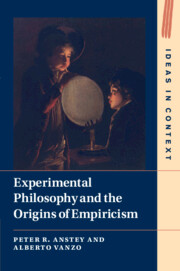Book contents
- Experimental Philosophy and the Origins of Empiricism
- Ideas In Context
- Experimental Philosophy and the Origins of Empiricism
- Copyright page
- Contents
- Figures
- Tables
- Acknowledgements
- A Note on Citations
- Abbreviations
- Introduction
- Part I The Rise of Experimental Philosophy
- Part II The Heyday of Experimental Philosophy
- Chapter 4 Mathematical Experimental Philosophy
- Chapter 5 Experimental Philosophy in France
- Chapter 6 Experimental Natural Philosophy and Moral Philosophy
- Part III From Experimental Philosophy to Empiricism
- Conclusion
- Manuscripts Cited
- Newspapers, Broadsheets, and Almanacs
- References
- Index
Chapter 5 - Experimental Philosophy in France
from Part II - The Heyday of Experimental Philosophy
Published online by Cambridge University Press: 17 February 2023
- Experimental Philosophy and the Origins of Empiricism
- Ideas In Context
- Experimental Philosophy and the Origins of Empiricism
- Copyright page
- Contents
- Figures
- Tables
- Acknowledgements
- A Note on Citations
- Abbreviations
- Introduction
- Part I The Rise of Experimental Philosophy
- Part II The Heyday of Experimental Philosophy
- Chapter 4 Mathematical Experimental Philosophy
- Chapter 5 Experimental Philosophy in France
- Chapter 6 Experimental Natural Philosophy and Moral Philosophy
- Part III From Experimental Philosophy to Empiricism
- Conclusion
- Manuscripts Cited
- Newspapers, Broadsheets, and Almanacs
- References
- Index
Summary
This chapter examines the impact of experimental philosophy in France from the mid-1730s through to the period in which the philosophes were at the forefront of French intellectual life, the period normally called the French Enlightenment. The chapter opens with a discussion of the reception of Bacon’s views about natural history and the acceptance of experimental philosophy more generally in the early Parisian Academy. It then turns to the heyday of experimental philosophy in France which began in the mid-1730s with its promotion by the likes of Voltaire and Comte de Buffon, and the courses in experimental philosophy taught by Abbé Nollet. It is argued that the anti-speculative sentiment so prevalent in Britain manifests itself in the anti-system debate in France. And the chapter goes on to examine the alignment between Buffon’s conception of natural history and that of Bacon, the Baconianism of Denis Diderot, and the influence of experimental philosophy on Jean Le Rond d’Alembert as manifest in his ‘Preliminary Discourse’ to the Encyclopédie. The chapter concludes with an appraisal of the rehabilitation of Descartes, who up to that point had come to be regarded by many as the archetypal speculative philosopher.
Keywords
- Type
- Chapter
- Information
- Experimental Philosophy and the Origins of Empiricism , pp. 149 - 175Publisher: Cambridge University PressPrint publication year: 2023

